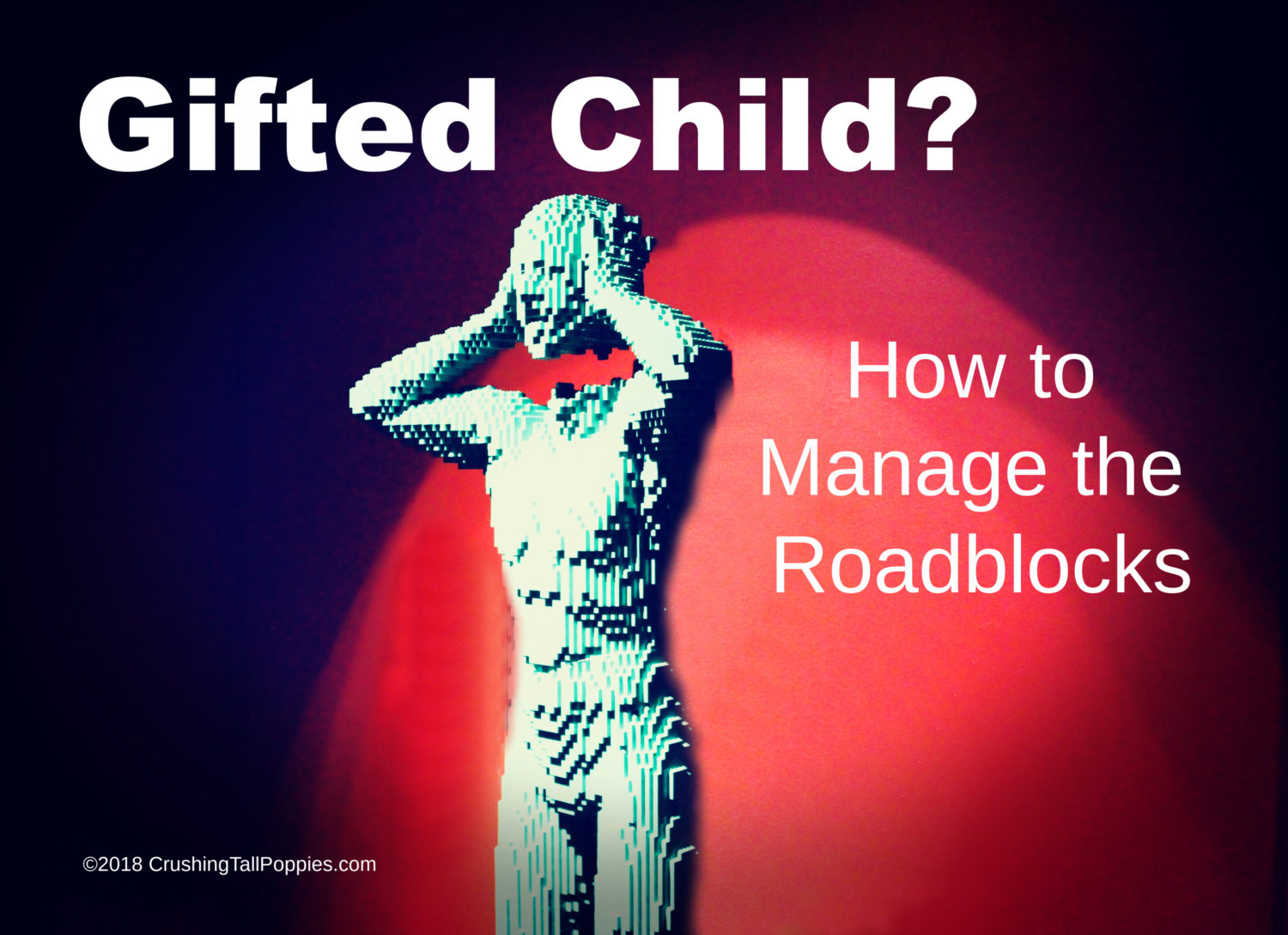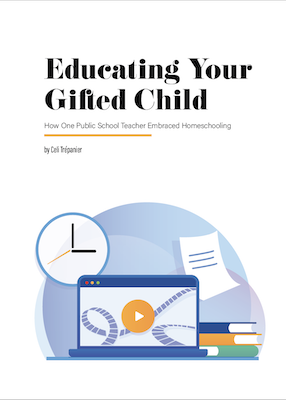Gifted Child? How to Manage the Roadblocks
Posted by Celi Trépanier on Monday, October 22, 2018 · 14 Comments

You’re the parent of a gifted child, or maybe all of your children are gifted. If you are just starting out on this journey, you may not as yet have come across many of the stumbling blocks those of us who have traveled before you have. If you are well into your journey—yeah, you already know that there are stumbling blocks. Maybe you would even call them roadblocks, abysses or black holes. This is the best way I know to manage those roadblocks.
THE ROADBLOCKS
To be gentle and to not scare the crap out of you, I’ll refer to them in a less negatively-impactful way—let’s simply call them roadblocks, shall we? Stumbling blocks doesn’t quite describe what we face as parents of gifted children.
These roadblocks most often start in preschool—perhaps when your gifted child is sitting in circle time singing the ABC song and learning his numbers, colors, and letters which he already knows, and has for some time now. Not only does he know his letters, he knows how to read. Numbers? He’s doing single-digit addition—in his head. To relieve his boredom, what’s a 3- or 4-year old to do? He may chat it up with his classmates or he begins to have trouble sitting still during that torturous circle time. And then you, the parent, get that first behavior notice from his teacher. Roadblock!
You now have a parent-teacher conference set to talk about your gifted child’s behavior, but how do you advocate diplomatically for your gifted child without sounding, you know, elitist or judgy, or that could earn you the reputation of that parent?
Yet, both you and your gifted child admirably slide through preschool relatively unscathed and your child is still interested in starting Kindergarten, and that preschool roadblock seemed more like a speed bump.
Over the summer, your child started reading early chapter books on the 2nd and 3rd-grade level—she should have an easy time in Kindergarten, right?. Uh, whoa, nope. Your child comes home from Kindergarten the third week with her ziplock bag full of sight word flash cards—every word she knows already. She can even string them into sentences and weave them into her own little stories which she writes in her journal, are on scrap paper laying around, or on your reports for work, or electrical bills. She’ll write her little stories anywhere and everywhere if writing paper is not immediately available. Yes, your daughter is reading and writing, but her classmates are memorizing sight words. Your daughter is getting frustrated.
How do you advocate for your gifted child without sounding arrogant or seem like you are bragging, or end up having your child’s teacher peg you as that parent? How do you tell your child’s teacher that your gifted child already knows the information being taught without the teacher getting offended or defensive? You know your gifted little girl needs more, but what your child’s teacher may say is that your daughter still needs to learn age-appropriate social skills, or that skipping ahead may leave gaps in her education. And you begin to notice your daughter becoming unhappy with school, asking you many mornings if she can stay home.
No speed bump here; this has become quite the roadblock, more like a barricade. After many parent-teacher conferences, IQ and achievement testing, and probably a bit of begging from you, your daughter’s school makes a few modifications to accelerate her learning. Your daughter and you make it through Kindergarten and immediately begin to dread 1st grade.
YOUR JOURNEY, YOUR ROADBLOCKS
Your journey and your roadblocks may differ from the above situations. You and your child may encounter envy over your child’s intelligence from other parents or classmates, or your child may become the victim of bullying because his unmistakable intelligence makes him stand out and the perfect target for bullies. These struggles, these roadblocks are real, they can be hurtful and damaging, not just for your child, but also your entire family. So, when your roadblocks become a real wrench in the spokes, or your family begins to feel the emotional pain of it all, you question what can be done to make your gifted child’s life better. Where do you turn for help and information? Who do you trust—the school or yourself?
GO WITH YOUR GUT
YOU, yes you, know your child best—better than anyone else. You know in your heart that she needs more, she needs different, and she deserves better. Yet, the school, your friends and maybe even your family are telling you to listen to what the professionals, the educators in your child’s life, are telling you. It feels like you’ve fallen into an abyss with no safety net, no solid solutions. What the heck do you do?
GO WITH YOUR GUT! What is your heart telling you? What is your gut instinct?
Going with your gut may mean going above your gifted child’s teacher, or the principal, and upwards into the school system to advocate for, to request, to demand an appropriate education for your gifted child. He deserves it, dammit!
Going with your gut may mean looking into other schools which may offer a better learning environment for your child where your child can be challenged and learn something new every day. Every child deserves to learn something new every day!
Going with your gut may mean looking into online learning programs offered through your public schools or privately so that your child can take accelerated classes in the subject areas he needs.
Going with your gut may mean seriously considering homeschooling which can afford your child the tailored education he needs, to follow his passions, and fulfill his potential.
THE SOLUTION LIES WITHIN YOU
I tell you this as a mom who did not go with her gut at first; as a mom who did not trust her instincts right away but went with what my children’s schools said they could or could not do. I tell you this as a mom who regrets not going with what my heart was telling me.
RESOURCES
If you don’t quite trust your instincts yet, do your own homework. Lucky for you, resources about giftedness in children are plentiful—books, blogs, websites, articles, studies, online forums, parent support groups. All the information, help and support you need to arm you with the knowledge you need to make the best decision possible for your gifted child. Here are some important links to the web’s best resources to get you started.
And, if you ever have any questions, reach out to me via my email: CrushingTallPoppies @ Gmail .com, or comment below because we have lots of readers who can offer expert answers to your concerns.
Crushing Tall Poppies Resources Page
Crushing Tall Poppies Facebook Page
Hoagies’ Gifted Education Page
SENG—Supporting Emotional Needs of the Gifted
And if you are considering homeschooling, when to make that decision, or how to educate a gifted child, my book is full of helpful advice!
Educating Your Gifted Child: How One Public School Teacher Embraced Homeschooling

14 Comments on “Gifted Child? How to Manage the Roadblocks”
Leave a Reply Cancel reply
This site uses Akismet to reduce spam. Learn how your comment data is processed.
Subscribe to Crushing Tall Poppies
About the Author

Privacy and Disclosure Statement
My Top Posts
- Testing Your Gifted Child: Considerations and Options
- Gifted Children: The Differences are Real
- Dear Teacher, My Gifted Child is in Your Class
- Being Gifted is Often NOT the Same as Being High-Achieving
- Understanding Gifted Parenting
- Anxiety in Gifted Children: 3 Simple Steps Parents and Educators Can Take
- When You Shut Down a Gifted Child, You Might Just Shut Down a Gifted Child—For Good
- 8 Things the World Must Understand About Gifted Children
- NO! For the Last Time, NOT Every Child is Gifted!
- #1 Gifted Students Do Not Always Excel in School
Follow Crushing Tall Poppies on Twitter
My Tweets
 Crushing Tall Poppies
Crushing Tall Poppies

Thanks for this—I tried, and mostly succeeded in dealing with a public school GT program through elementary. At times I felt like “that parent” and at times dealt with teachers who were unwilling to do any extra work, and at times dealt with teachers who flat out denied my children’s abilities. I think that hurt the most. It wasn’t until the day I was in the assistant principal’s office apologizing while I begged her to talk to my child’s teacher about giving him more interesting math, when she looked at me and said “Sarah, maybe he is “that smart” and you have to be able to accept that, and understand that as a public school there is only so much we can do.” Wow. She took the wind out of my sails, but from that point on I focused on the positives, and on extracurriculars, including sports, band and theater and applied to the most selective, advanced private school in our city. They’re there now, and thriving. It was the right thing to do. I’m a little sad that I lost most of my elementary mom friends when we made the switch, because even if they understand I think it’s still hard for people to accept when you make choices that differ from their own. And I’m still working on making connections at the exclusive private school, which is hard for other reasons, mostly maybe just that we don’t live close to school. I keep reminding myself to be grateful for the good friends I have and for knowing that my kids are-finally- happy in their new environment.
Oh Sarah, that is really awful what you had to go through to get your child the education he needs and deserves. But yet, it’s sadly not uncommon. I’ve heard before aboutt teachers and principals telling parents that the school cannot meet the needs of their gifted child and have gone so far as to tell parents they either need to find another school or homeschool their gifted child.
I am so happy to hear, though, that the private school is working out for your children and that they are happy.
I do understand about leaving your mom friends from the previous school–I’ve been there, too, and it’s not easy. I think our kids make the adjustment better than us parents when changing schools!
I sincerely hope that this new school continues to work out for your children. And thank you for sharing your story with us, Sarah.
Do you know of any free virtual learning programs that can be used in conjunction with public school education? My 5th grader is bored to tears at school & says it’s a waste of his time.
I know that Khan Academy is an excellent one. Also, I know these are homeschool resources, but they are educational resources–homeschoolers are pretty good about digging up good free or cheap educational resources. Check these out: https://www.thoughtco.com/free-homeschool-resources-4151635
Great advice about trusting your instincts. Parenting is a new journey for everyone, and it is often hard to believe that our children are as advanced as they are – especially when teachers and others around us keep telling us to slow down. We all need to trust our perceptions and recognize that our kids need the educational support they deserve.
Thanks! I wish I would have trusted my instincts long before I did!
Go with your gut! YES. Probably the simplest sounding of all advice, but the hardest to follow
Yeah, it is the hardest to follow when you are usually up against the experts or professionals who should know better. 🙁
Sadly enough, the “experts” and “professionals” don’t know better. Worse, many of them know just enough to be dangerous. And some of them got their positions by knowing nothing more than the right string-pulling powermongers.
When it comes to education, what is ambrosia to some, is ricin to others.
Exactly. And you said it perfectly! Thank you!
Celi this is fantastic- thank you so much! Sometimes those roadblocks feel insurmountable – or a figment of your obviously over active imagination as a hopeful parent – and articles like these are timely reassurances. This is relevant for parents of gifted children anywhere there is a schooling system and thank god for the internet and the world wide support system it affords us!
Thank you for you very kind words, Julie! Yes, the roadblocks are real and sometimes HUGE–we all need help and support to overcome.
YOU are a great resource, Celi. I’m sure many parents have benefitted from your experience and your wisdom.
Thank you! Just as YOU are Paula! <3